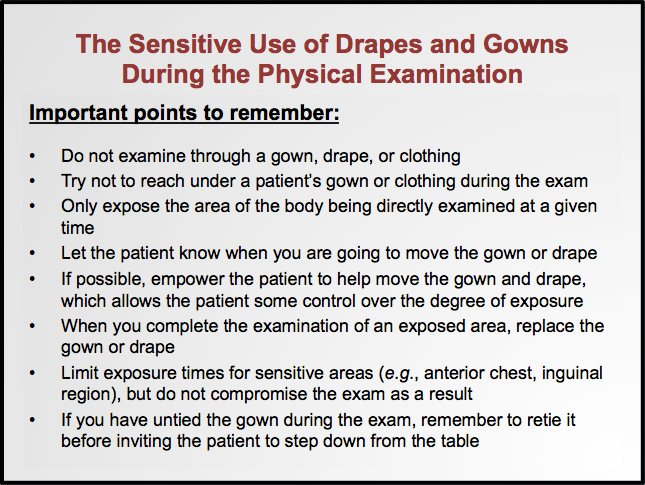Ajuste adequado da vestimenta do paciente durante o exame físico
Visão Geral
Fonte: Jaideep S. Talwalkar, MD, e Joseph Donroe, MD, Medicina Interna e Pediatria, Yale School of Medicine, New Haven, CT
Para otimizar o valor preditivo do exame físico, o provedor deve realizar manobras corretamente. O uso adequado de cortinas é um componente importante para a realização correta de manobras de exame físico. Lesões cutâneas são perdidas quando a "inspeção" ocorre através da roupa, os estalos são erroneamente relatados quando os pulmões são examinados através de uma camiseta, e os achados sutis no exame cardíaco não são detectados quando a auscultação é realizada sobre roupas. Assim, as normas de boas práticas exigem o exame com as mãos ou equipamentos em contato direto com a pele do paciente (ou seja,não examinam através de um vestido, cortina ou roupa). Além de seu valor clínico, a técnica correta de draping é importante para melhorar o nível de conforto do paciente durante o encontro.
Como todos os outros aspectos do exame físico, é preciso pensamento e prática deliberados para encontrar o equilíbrio certo entre o draping, que é feito para preservar a modéstia do paciente, e a exposição, que é necessária para otimizar o acesso às peças que precisam de exame. Os estilos individuais de provedores no uso de vestidos e cortinas variam consideravelmente com base no local da prática, disponibilidade de recursos e disciplina dentro da medicina. Este vídeo fornece uma visão geral de algumas das técnicas mais comuns utilizadas, combinando técnicas que utilizam abordagens comuns de draping.
Procedimento
1. Manobras que podem ser realizadas enquanto o paciente está usando roupas de rua
Note-se que alguns aspectos do exame físico podem ser realizados em pacientes enquanto eles estão usando roupas de rua que permitem a exposição da região a ser inspecionada. Essas manobras incluem a medição dos sinais vitais, aparência geral, o exame HEENT (Cabeça, Olhos, Orelhas, Nariz e Garganta), o exame do pescoço, o exame abdominal, o exame vascular e o exame neurológico.
- Para medir os sinais vita
Aplicação e Resumo
O uso sensível de vestidos e cortinas durante o exame físico é importante para encontrar um equilíbrio entre o conforto e a exposição do paciente(Figura 1). O exame não deve ser comprometido pela preocupação do médico com a exposição do paciente, uma vez que o uso adequado de draping permite que o exame adequado seja realizado na maioria das circunstâncias clínicas. O exame através de roupas, lençóis ou vestidos é uma técnica incorreta, embora apenas as áreas do corpo que estão sendo...
Pular para...
Vídeos desta coleção:

Now Playing
Ajuste adequado da vestimenta do paciente durante o exame físico
Physical Examinations I
83.5K Visualizações

Abordagem Geral para o Exame Físico
Physical Examinations I
117.8K Visualizações

Observação e Inspeção
Physical Examinations I
95.4K Visualizações

Palpação
Physical Examinations I
84.8K Visualizações

Percussão
Physical Examinations I
102.2K Visualizações

Auscultação
Physical Examinations I
62.5K Visualizações

Aferição da pressão arterial
Physical Examinations I
109.1K Visualizações

Medição de Sinais Vitais
Physical Examinations I
116.6K Visualizações

Exame Respiratório I: Inspeção e Palpação
Physical Examinations I
157.7K Visualizações

Exame Respiratório II: Percussão e Auscultação
Physical Examinations I
213.3K Visualizações

Exame Cardíaco I: Inspeção e Palpação
Physical Examinations I
176.9K Visualizações

Exame Cardíaco II: Auscultação
Physical Examinations I
140.3K Visualizações

Exame Cardíaco III: Sons cardíacos anormais
Physical Examinations I
92.0K Visualizações

Exame Vascular Periférico
Physical Examinations I
69.0K Visualizações

Exame Vascular Periférico Usando Doppler de Onda Contínua
Physical Examinations I
38.6K Visualizações
Copyright © 2025 MyJoVE Corporation. Todos os direitos reservados
